VIENNA (AP) - Austrian conductor Nikolaus Harnoncourt, whose career first focused on a search for authenticity in Baroque and other old music and later expanded into masterful interpretations across the classical spectrum, has died. He was 86.
His death Saturday was announced by his wife, Alice Harnoncourt, who said he "passed away peacefully, surrounded by his family." No cause of death was given.
One of the last great postwar Austrian conductors, alongside Herbert von Karajan, Karl Boehm and Carlos Kleiber, Nikolaus Harnoncourt's concern for historical detail was legendary. He thought of his conducting as alive and romantic, not a relic of history.
His recording of Bach's St. Matthew Passion won a Grammy Award in 2001, one of many awards recognizing his unrelenting drive for perfection that put him on the level of other great postwar Austrian conductors Herbert von Karajan, Karl Boehm and Carlos Kleiber.
While remaining true to his love of Haydn, Mozart and their predecessors, all of whose works laid the foundation for later masters of classical music, he later expanded his repertoire to include 19th-century opera favorites such as Verdi's "Aida" and individually accented interpretations of works by masters as varied as Beethoven, Schubert and Richard Strauss. Already in 1999, Switzerland's Neue Zuercher Zeitung labeled him "the protagonist of the new expressionism."
As a cellist in 1953, he founded the Concentus Musicus Wien, a platform for his work on Renaissance and baroque music that uses period instruments and will remain his calling card. Early performances were mostly private and critics unused to the sounds of the original instruments used by the ensemble were initially hostile.
But the troupe's reputation grew, especially after a recording of Bach's Brandenburg Concertos in 1962. The repertoire expanded into Monteverdi works. First tours of the United States and England came in 1966, and of Germany two years later.
Leaving his cello behind, Harnoncourt made his debut at the conductor's rostrum in 1972 with Monteverdi's "Il ritorno d'Ulisse in patria" at the Piccola Scala in Milan.
A few years later, his breakthrough was complete after teaming up with French director Jean-Pierre Ponelle on a celebrated cycle of Monteverdi operas performed at the Zurich Opera House on period instruments, starting with "L'Orfeo" in 1976.
Harnoncourt is survived by his wife, three sons and a daughter. Funeral arrangements weren't immediately announced.
